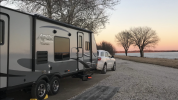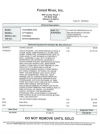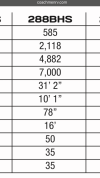High dry hitch weight on that one (720lbs). Personally trying to narrow my search to trailers with dry hitch weights under 600lbs. My payload is about the same as yours (1268).
I'm in the same boat you all are with right at 1300 payload and 8,000 lbs total due to things like the Ramboxes, barn door tailgate. I've found to maintain about a thousand total weigh cushion, with trucks in this range, is that around 5500 dry weight and 600 dry hitch weight is your limit also. IF you have two group 24 batts on it and two 30 gallon propane tanks full, you add allmost exactly 200 lbs to the 600 lb dry hitch weight. Then tack on around 80 lbs for your weight distribution hitch. AND then you only got like 400 lbs payload left. Use it carefully. Two people and dogs and you are pretty much done. We don't put anything in the back except empty crates for the things we might buy on a trip and a cooler.
An IMPORTANT piece of information many people do NOT know is that payload is figured with FULL fluids in the truck INCLUDING GAS. So, you do NOT need to worry about your gas as a payload factor except knowing 30 miles down the road with a trailer and you just dropped 25 lbs of weight (approx 8 lbs per gallon). So, you can do the math and realize that except after a fill up you are dropping about 8 lbs per 10 miles towing.
Frankly, I don't like 30 lb propane tanks. It's so easy to grab 20 pounders everywhere and if you go with two 20's, you can pick up around 45 to 50 lbs. Same with a battery. Having one is another 45 lbs. So, by dropping a batt and going with smaller propane tanks can pick up in the range of 100 lbs. Now this may be a problem for those week long dry campers, but for most people it will work as you will likely have a genset of some sort. Further, my gray and black tanks and water sit over the axles or behind them. That impacts tongue weight to your benefit IF your trailer is designed that way. So, look for that in your design. But so does what you put in front storage. In the end about a wash. You can put one of those flip up hitch carriers on the back and put your genset on there also, or bikes etc. But watchem close.
So, I sort of look at it as a gestalt, looking at all the factors. I did have aftermarket airbags on my 2015, but the 2021 is actually better and so far the new set of airbags has not been installed. Yes, I know they do NOTHING for payload etc., but they can make some trucks feel better on the tow.
So, I'm driving down the road and looking at the dynamic of the towing experience including gas weight, WDH experience, and everything, I'm probably slightly over when I fill up the tank and slightly below 70 miles down the road. I watch closely ALL the factors and do my best to stay within limits but I know it is NOT a static event.
In reality, and realistically, a 500 lb tongue weight on the trailer would be best, but good luck finding a 5500 lb (dry), 6700 wet travel trailer with that. AND so, adjust your trailer WANTS carefully. The key factor often on a travel trailer is a slideout. For example, with a husband wife and two kids, on a relatively tricked out truck and a 1300ish payload, you are pretty much at payload when you take off with two batts and two 30 lb propane tanks. Keep the dynamic in mind. BUT, if you get, for example, a 27 or 28 foot bunkhouse WITHOUT a slide, there are some 5200 to 5500 lb travel trailers (bunkhouse) that do have a 500lb tongue weight. IF you want a door on your bedroom, add a couple of feet to length. Put a slide on and you are going to be at 600 dry tongue weight, get over it. I research assiduously as a retired guy and find it a general rule of thumb. I've been towing since 2004 starting with a Subaru Forester and a pop up moving to a smaller bunkhouse and now my Aspen Trail 2340 BHS that checks her boxes but pushes my envelope...
IF, you are that younger family want "full size bed" bunks (the 28/30 inchers get old real fast) and don't mind having the main bedroom area open, you can easily do a 25 footer (bunkhouse) without a slide all day with a 1300 ish payload and 8K total weight. AND 25 foot will get you into a lot of campsites a longer one won't. 25 feet is a sweet spot for amenities and campsite access. It checks all the boxes for families (twoish kids). There are some nice units out there in this range. We have a dinette/pantry slideout because we are old and got tired of watching the dog back down the hallway...
Or get a slide full big tanks and batts...and then you go back to the things I noted earlier in the post if you want to pick up some lbs. OR...get fewer bells and whistles on the truck and pick up some payload from the gitgo. To be honest, the longer Gen5 and a quad cab will pick up a couple hundred lbs quick and now days the quad cabs and tweeners to College age is not a real problem..















